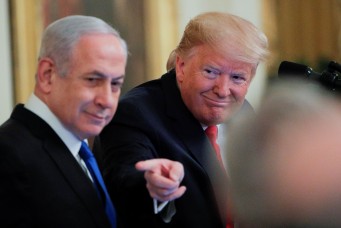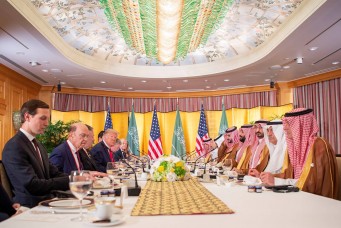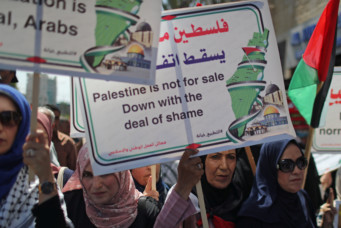Delusions of a Deal
Donald Trump claims he is the master of deal-making, but will his much-touted “Deal of the Century” be favorable to the Arabs and Palestinians?
Donald Trump claims he is the master of deal-making, and describes his policies and achievements as either the best, biggest, or greatest. Trump, however, has not been in office long enough to truly see if his penchant for striking grand bargains bears fruit. His approach to resolving the Palestinian-Israeli conflict is no exception. His decision to move the U.S. embassy from Tel Aviv to Jerusalem in December 2017 shocked the Palestinians and the Arab World. Unilaterally and incomprehensibly, he has taken Jerusalem off the negotiating table, leaving his administration officials to comically explain that this decision does not in fact preempt the outcome of negotiations between Israel and the Palestinians.
No less important has been his repeated assertion that the United States does not insist on a two-state solution for resolving the conflict, and would support any agreement both parties reach. Coming from the main broker of the peace process, this ambivalence on the core principle for settling the Israeli-Palestinian conflict calls into question the credibility of any future negotiating process.
Taken together, these two decisions are greatly detrimental to the prospects of a peacefully negotiated resolution to the Palestinian-Israeli conflict, which even today seems distant because of the ceaseless expansion of illegal Israeli settlements in the occupied West Bank. In that case, Trump was merely enunciating policies that reflect this painful reality.
However, public statements by Arab officials indicate that while they prefer not to directly reject the administration’s approach, they emphasize the paramount importance of a two-state solution, as well as Jerusalem, to any resolution to the conflict. Such statements could be interpreted as pro-forma statements meant to absolve responsibility on the Arab side. Alternatively, they could be intended to deter the administration from irresponsibly shaking the basic tenants of every Arab-Israeli agreement, which has always been a Palestinian state based on the 1967 borders and recognition and security for all states in the region Arab—including Palestine—and Israel.
Trump’s Middle East proposals have been in incubation stage for months now. The deal was meant to forgo getting bogged down in details, focusing instead on creating a healthier environment for future negotiations by providing Israelis with a broader Arab political engagement and Palestinians with greater economic incentives. It was soon recognized that Trump’s “new” deal was too Israeli-centric and provided little real incentive for Palestinians to realize their national aspirations.
The administration’s pressure on the Palestinians through withholding a portion of U.S. economic aid, and calling into question the continuity of the Palestine Liberation Organization or its representation in Washington, did not succeed in swaying the Palestinian leadership. While Arab countries attempted to contain bursts of public discontent in response to the relocation of the U.S. embassy to Jerusalem, Egyptians, Jordanians, and Saudis, publicly and privately, suggested that such a decision had made it significantly more difficult to support the American proposals. Jordan’s King Abdullah attributed the recent domestic disturbances to instigation by unnamed foreign elements as retribution for his refusal to soften his stand on Jerusalem.
Although still unannounced, it seems that the administration’s proposals are undergoing revision in response to the misgivings voiced in the region. Among the changes being considered is the establishment of a “Palestinian capital” in Jerusalem centered on the Abu Dis suburb, and ensuring freedom of religious expression for everyone in the Old City. Additional Palestinian access to territories in Area C of the West Bank in the Jordan Valley, but without territorial contiguity, appears to be another idea. Other ideas include international compensation for Palestinian refugees in exchange for dropping the demand for their “right of return,” direct economic incentives for Palestinians in Gaza and the West Bank, and potentially, joint economic zones with neighboring states. All outstanding details regarding final borders and the actual nature of the governing Palestinian authority would be left for future negotiations including the possibility of a two-state solution if agreed upon.
In exchange, Israel would maintain its control over the West Bank; its land and maritime security arrangements concerning Gaza would be recognized; and its position in Jerusalem would remain unchallenged. The absence of any reference to the 1967 borders in the U.S. proposals would pave the way for significant territorial adjustments—for example, the large settlement blocs in the West Bank and around Jerusalem that would be annexed by Israel. Implicitly this strategy would absolve Israel of any responsibility for return or compensation to Palestinian refugees. Moreover, the deal would resolutely confirm Israel’s right to absolute security through cooperation with its neighbors. Most importantly it would open the door for a wide-ranging normalization between Israel and the Arab World, before and not after, the conclusion of detailed negotiated agreements with the Palestinians and other Arabs as was originally stipulated in the Arab Peace Initiative adopted at the Beirut Summit in 2002.
The Trump administration expects the Arab countries to politically support these proposals by influencing the Palestinian authority, engaging more publicly with Israelis, and bankrolling the package of economic incentives. It would be presumptuous to draw conclusions on the consequences of the proposed “Deal of the Century” before such proposals are made public. They do, however, still seem to only offer Palestinians little hope for a better future in exchange for immediate concessions and incentives to Israel in the form of regional recognition. This is ironic given that Israel is the occupying power and the Palestinians are an occupied people seeking to realize their inherent right to achieve a state of their own. Changing these parameters would probably not be accepted by the Palestinians. It would also render the prospect of a broader Arab-Israeli peace through the settlement of Israel’s conflict with Syria and Lebanon almost delusional.
Nabil Fahmy, a former foreign minister of Egypt, is the founding dean of the School of Global Affairs and Public Policy at the American University in Cairo.




